- Home
- Alex Archer
Provenance Page 7
Provenance Read online
Page 7
“You’re right,” Annja said, a little shortly.
He blinked at her like an owl at a hunter’s jacklight. “You agree?”
“Oh, yes.”
He nodded. He seemed pleased. His brief reserve had melted away into good-feeling and relief so overt and sloppy she was afraid he’d burst into tears.
“Well then. You might be surprised at what I will tell you, but you may not reject it out of hand, as I feared a skeptic would. As I would, before I became a reporter and began to see how the world really worked.”
“Don’t tell me anything that’s going to endanger you,” she said. It cost some effort to do so. But if I let my integrity slip I’m no better than those I fight against, she thought.
He shook his head. “It’s already beyond that, dear lady. Oh, if you went to the authorities, things would go hard with me. But the greatest risk is knowing what I know. What I dare not say. Because, you see, I have been warned.”
“Warned?”
He nodded his head emphatically. Then he stopped abruptly, as if afraid it might fall off. “Warned. Warned that if I tried to publish what I had learned, well—there’s always plenty of room in the broad Pacific Ocean for another body to float in.”
“Don’t keep a girl in suspense,” Annja said.
But he suddenly became coy. “But it is hard to talk when one’s throat is dry,” he said.
Part of her, a somewhat cynical side she suspected she should be ashamed of, actually exulted—a potential informant I don’t have to get drunk! That was always a pain and entailed certain risks. Although Annja usually found it much easier to get a guy drunk than a guy would getting her drunk. She despised the sensation of being out of her own control.
But Guillermo was beyond mere drunkenness to the point where Annja’s saying, “Here, will you finish my beer for me? I hate to see it go to waste,” was received, not with instant ice-bath-sobering suspicion, but with a sly sloppy joy, as if he’d somehow, without even trying, put something over on her.
He swigged at it happily and wiped his mouth with the back of his hand. “Better. Much better. Now. I have excited your curiosity, no?”
“Why, yes. Don’t be a tease, Guillermo.” That was as far into flirtation as she intended to stray. She despised teases, and in general tried not to lie. That said, if lives lay at stake, she would do as she must.
“I know a man,” he said. “Not a good man. But one who has no reason to lie. Also he has given me information before which was good as gold.
“He saw what happened at that boathouse. He was watching from an abandoned shop nearby—what he was doing there he did not say, and I did not need to know. Nor do you. He saw only from the outside. But what he saw was armed men who approached the boathouse from cars they had parked some distance away. They suddenly burst inside, as if in response to some signal. And then he heard shouts, and screams, and a poh-poh-poh, as if someone was using an air wrench on an automotive tire.”
“Oh,” Annja said, rearing back. She saw no reason to pretend not to know what a suppressed firearm sounded like.
Guillermo nodded. “He was frightened, as anyone would be. But he is a curious man. I do not know if he is brave, so much—he has more curiosity than sense. Just like a monkey. And we’re really all just monkeys, we humans, are we not?”
“We’ll make an anthropologist of you yet,” she said, which seemed to please him. She prodded him gently back on track. “So what did he see?”
“He saw a large object. Much longer than it was wide or high. A box. Its shape was, shall we say, suggestive?” The way he said suggestive did not bring to mind lascivious eye-rolling and hands making violin shapes in the air, but something darker. “A plain pinewood box. It seemed very heavy. It was being carried by a front-end loader.”
“What happened to it?” Annja said.
“A panel truck backed up. The men shoved it inside with much grunting and cursing. That was how he knew how very heavy it must be. And the cursing was in English. NorthAmerican English, señorita. My acquaintance, let us say he has frequent contact with tourists. He can recognize English accents, as some North Americans can identify Spanish ones—as you yourself can, if I am not mistaken?”
She bit her lip. I can see why he makes a good reporter, she thought. Even with his brain sloshing, he’s pretty perceptive. She hoped he wouldn’t be too keen in scrutinizing her.
“I can,” she admitted. She knew if he caught her in a lie he’d glue his lips shut.
“And it was what he heard that was most intriguing indeed. What I very most wished to share with my editors. And which they told me, flat out, they did not wish to hear.”
“Which was?” If he hits me up for another beer now, I am totally going to smack him, she thought.
He smiled a wide, moist-lipped smile. “Why, the name of its destination. A freighter, he said.”
“What was it?”
He shook his head. “That he would not say. He wanted money. A substantial sum. More than I had on hand, shall we say?”
“So you did try to take the story to your editors?” Annja asked.
“Oh, yes. Yes, indeed. I did try that.”
“What did they say?”
He shrugged. “They seemed very…what would you say? Reserved. Not excited, as they should be at such a scoop, no?” He picked up a fresh bottle and cradled it in both hands as if afraid cruel hands might try to pluck it away. “And then not long thereafter I received a visit from certain parties. Which I took, incidentally, to represent in its way the position my editors had taken on my story.”
“Police?” Annja wondered.
Again he shrugged. “Who can say? They made it clear their visit was official. But off the record—as they wished my story to remain.”
He set the bottle on the bar before him and regarded it sadly. “I am a young man,” he said. “I believed myself willing to put my life on the line for the truth.”
He looked at her, and something like defiance blazed in his bleary eyes. “And perhaps I am. But—” He shrugged and sighed. The fire went out. His shoulders slumped and the muscles of his face, briefly taut with passion, sagged. He seemed to age twenty years right before her eyes.
“It seems not so noble to die for a story that will most certainly be spiked.”
She put her hand on his. “This may be little consolation. But I tell you truly, Guillermo—you’re right. A brave man does not simply toss his life away. Any dog can die in a ditch.”
He gazed at her. “You are most wise, despite your lack of years.” He raised the bottle. “I salute you.”
She laughed. “Don’t be too impressed. It’s an old samurai proverb.”
“You’re a student of the martial arts?” he asked.
“Yes.” She saw no harm in imparting that truth.
“Good, good,” he said. “They may come in useful when you go to see my man. If of course, you choose to do so. He lives near the old docks, where the shootings took place. In a part of the CascoViejo that is not so quaint. Although it is picturesque in its own way.”
He gave her an address, and directions that were likely to be of more use. She memorized them easily.
“Thank you for trusting me,” she told him. “You took a great risk, I know. But I will try to justify it.”
“I do risk much,” he said. “And I hope you can make use of what I have told you.
“But then,” he said, and his manner suddenly seemed more sober, “I know the famous Annja Creed is not a spy for the Panamanian police. Whether she is a spy for her United States Central Intelligence Agency I am willing to risk. Because, I think, who better to make use of information I am denied the use of?”
He stood up. His legs were perfectly steady. So were his eyes as he smiled.
“Many thanks for the drinks,” he said and he walked out of the bar—not like a man intoxicated, but rather like one who had just relieved himself of a heavy burden.
Annja stared after him long after he�
�d vanished into the early subtropical night. Was he setting me up? she wondered. Somehow, she doubted it. His bitter chagrin, and his relief at finding someone who might actually make use of his information, had seemed genuine. Even if his level of inebriation wasn’t.
Whether it’s a trap or not, you’re going to walk into it with your eyes open and trust your reflexes. Because that’s what you do. She realized one of the bottles on the bar in front of the young reporter’s vacant stool was only half-empty. She realized most of what she had taken for thoroughly dead soldiers were.
She picked up one and drained it. After all that, she needed a drink.
10
Annja’s hopes of avoiding the bizarre, public transportation system the next day were dashed when her cabbie, a black Panamanian, refused to take her to the barrio where the address she was looking for could be found. He explained in eloquent and vigorous English and Spanish that that was no place for a nice American lady to be.
She thanked him for his concern, paid him off and tipped him well for bringing her from downtown and set off on her own. Two hours later she found herself in what she hoped was the right neighborhood. She could have walked there, she guessed, in about a quarter of that time.
As it was she still had a walk of several blocks past garbage-strewn lots sporting sundry ruins dissolving back into lush subtropical undergrowth, and of desperate government housing blocks, more resembling prisons than apartments, with slab cinderblock walls and razor tape tangles surrounding them. The rusting metal skeletons of derelict cars, some burned out, dotted the cracked and root-heaved streets like casualties of war.
It reminded her of parts of Brooklyn.
Plenty of knots of young men with bodies the consistency and color of tropical hardwood slouched on the corners or perched on car corpses. Without even thinking about it she changed course to avoid them when she could.
Since coming into possession of the sword she had found herself becoming far more solicitous to avoid potential confrontation whenever possible. It was precisely because she possessed such very final means of ending physical attacks. The sword’s terrible power, the ease with which it carved human flesh and bone, rubbed her nose in the responsibility of carrying it.
The best way to win a fight, she’d discovered time and again, was to ensure it never started. She had studied the body language of victims—so as to avoid it. She learned to assess her surroundings and who was in them, to recognize potential threats far in advance. For the most part it wasn’t particularly challenging—she found it kind of fun, actually. And she religiously did something a lot of people she’d talked to, to her surprise, really resisted. When she identified a potential threat, whether it was a pack of adolescent males or a dark bottleneck with lots of places for muggers and rapists to lurk, she’d go out of her way to avoid it. Many people, it seemed, would rather risk getting robbed at gunpoint, beaten, or worse than be ninety seconds late for work.
Perhaps not too surprisingly, it turned out that not-a-victim behaviors were pretty much what she’d done her whole life. That was simply the way she was. She made herself mindful of the habits, and put a little more emphasis on them.
So when she couldn’t entirely avoid the rootless young pack predators, since the only way to do that would be stay out of this area completely, she made eye contact, smiled and nodded. It was the same thing she always did with people on the street, even in New York City where the response tended to be hostility or paranoia, if not both. If they continued to look at her hard, she kept smiling—but hardened it a bit, and thought, If you mess with me, you’ll wind up bleeding and I’ll be inconvenienced. So don’t start.
As usual, no one did.
The apartment block where her hoped-for informant lived was one of the dreary many, neither the most desperate nor the most inviting. Once inside she found herself the object of attention by groups of dirty and ragged little kids. She smiled, nodded, said hi. They giggled and ran off.
People watched her from doorways as she climbed up three flights of dingy metal stairs to the third-floor apartment address Guillermo Miller had given her. Their expressions were more suspicious than anything else, except maybe disbelieving. She could hardly have been more out of place if she’d been an alien. Again, she just smiled and nodded.
Abenicio Luján answered the door on the first knock. He was a wiry little guy with a snub nose in the face of a wizened boy, short curly black hair dusted with gray and bandy legs. She saw why Guillermo described him as a monkey. Guillermo had mentioned he lived with “one of his girlfriends.” This was more information about his private life than Annja cared to know.
His manner was less suspicious than she had expected. She anticipated Guillermo had called him to warn him to expect a visitor—and to give him a chance to disappear if he feared the contact was risky. She now realized one or more of the young men she’d passed on the stairs had almost certainly called him to warn him she was on the way.
Poor people, she had found, either lived in a war of all against all, or they looked out for each other. Actually, they tended to do both, dividing into factions by neighborhood, apartment block, or extended family. Outsiders tended to dismiss, or dread, such assemblies as gangs.
Annja knew, in truth, such groupings were often necessary accommodations to the brutal realities of poverty, especially in places where caste lines or regulation made any kind of economic advancement next to impossible.
Luján, she judged, was probably a marginal type even by the standards of this brutal and ugly place. But he too was part of the net.
Two crisp U.S. twenties were enough to start him talking. He described the scene at the boathouse much as Guillermo had. The curious activity, the men with guns suddenly converging and going inside. The strange sounds. The screams.
He didn’t say how he happened to be creeping around the vicinity, undetected by the boathouse killers. Annja didn’t ask. She didn’t need to know.
“So what happened next?” she asked.
He scratched himself under the left arm and looked as if he were trying to remember. “You get the rest of the money when I get information worth paying for,” she told him briskly. “Right now I haven’t heard anything to justify what I gave you.”
“Look, señorita,” he said, his black bright eyes darting up and down the walkway, “I’m putting myself way out on a limb telling you this. Those were some bad men there at the Old Harbor.”
“Good men don’t usually shoot people down without warning,” she said, “even men as bad as the ones who got themselves killed were. Listen, Mr. Luján. You’ve already said enough to risk becoming a target. I’m making myself one by being here talking to you. So here’s the deal—tell me the rest and I’ll pay you more. Or you’ll be in the same amount of danger without having as much spending money in your pocket when you take that little trip for your health.”
He laughed. “You’re pretty sharp for a gringa, señorita. I bet all the gringos run away scared from you.”
“Only when I show my teeth, Señor Luján.” If only that were true, she thought.
“Okay. The killers, they come out of the warehouse. They were big men, gringos, too. I don’t speak the English good, but I understand it, pretty right. All except one. He was a real skinny guy, dressed all in white, in a white hat and sunglasses. Real pale skin. He was the boss, I could see that. The others, they were all scared of him, even though one of them could twist him in two.”
Annja nodded encouragingly.
“And so they backed the truck up, like I said, and moved this big old crate off the front-end loader into the back. They really had to fight with it, you know? And when it went inside, the truck sank down on its springs. It was heavy.
“Then the guy dressed all in white, he says, ‘The Solomon King ups anchor in two hours. Make sure that’s aboard.’”
“The Solomon King? Not the King Solomon?” Annja asked.
He shook his head. “No. I may not have heard right. But it
sounded like that.”
She set her mouth. She could sense he wasn’t jacking her for more money. The way he was starting to rock and bounce on his toes she could tell he was eager to get this over with and make good his escape.
“Anything else?” she asked.
He shook his head. “Swear to the Virgin, señorita,” he said. “They all got in cars and SUVs and drove away. After I was sure they were gone, I got the hell out of there myself. And that was that.”
She gave him a fifty and left.
ANNJA MADE IT to the Panama City harbor master’s office an hour before closing. Ship departures were public records. She had checked for the date of the boathouse massacre. The offices were brightly lit, well-organized and well run. The canal did too much business, and was feeling too much pressure from potential competition and its own rising passage fees, to be run any other way.
Her heart fell into her now-swollen feet when she found no vessel named either Solomon King or King Solomon. She took a deep breath and scanned the entries again. This time she spotted the name on a registry—Solomon Kane.
Heads turned as she laughed out loud. Apparently the harbor records weren’t usually an occasion for hilarity.
“Sorry,” she told the inquiring faces. Eyes rolled, then looked studiously away.
IN HER TENTH-FLOOR ROOM in the hotel Annja sat cross-legged on the bed. She had her notebook computer propped on a pillow in front of her so its processor heat wouldn’t burn her bare thighs. She was wearing shorts and a T-shirt and thoroughly enjoying the air-conditioning after the day’s exertions.
Somebody’s got a sense of humor, she thought, as she sent out inquiries to her contacts around the world. None of whom were her Romanian acquaintance in Berlin. She didn’t want to go to that well too often.
Over the music coming in through her iPod earbuds she heard her computer chime. A message popped up in the lower right-hand corner of her screen to let her know she had one new message. She clicked it.

 Rogue Angel: Forbidden City
Rogue Angel: Forbidden City The Spider Stone
The Spider Stone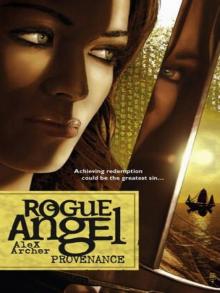 Provenance
Provenance Blood Cursed
Blood Cursed Fury's Goddess
Fury's Goddess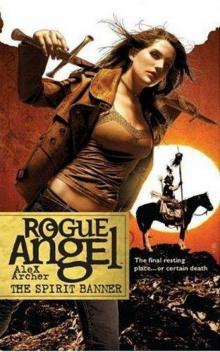 The Spirit Banner
The Spirit Banner Footprints
Footprints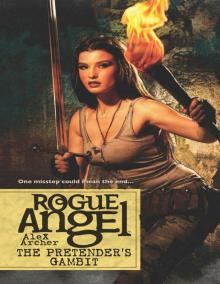 The Pretender's Gambit
The Pretender's Gambit Rogue Angel: The Lost Scrolls
Rogue Angel: The Lost Scrolls Staff of Judea
Staff of Judea Rogue Angel 55: Beneath Still Waters
Rogue Angel 55: Beneath Still Waters The Mortality Principle
The Mortality Principle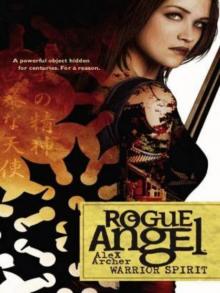 Warrior Spirit
Warrior Spirit Paradox
Paradox Tear of the Gods
Tear of the Gods Forbidden City
Forbidden City River of Nightmares (Rogue Angel)
River of Nightmares (Rogue Angel) Rogue Angel: The Secret of the Slaves
Rogue Angel: The Secret of the Slaves Destiny
Destiny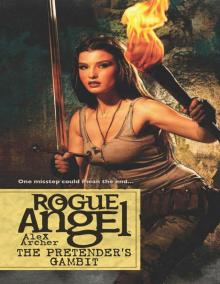 Rogue Angel 51: The Pretender's Gambit
Rogue Angel 51: The Pretender's Gambit Celtic Fire
Celtic Fire Rogue Angel 54: Day of Atonement
Rogue Angel 54: Day of Atonement Day of Atonement
Day of Atonement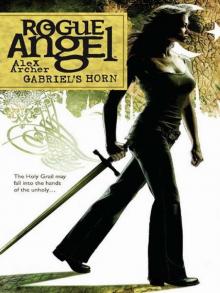 Rogue Angel: Gabriel's Horn
Rogue Angel: Gabriel's Horn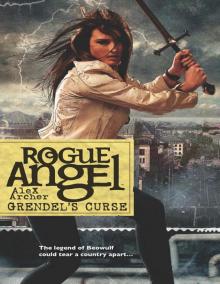 Grendel's Curse
Grendel's Curse The Matador's Crown
The Matador's Crown Rogue Angel: The Chosen
Rogue Angel: The Chosen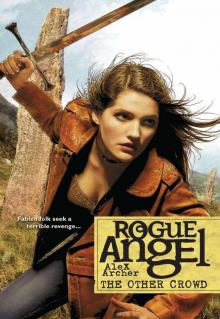 The Other Crowd
The Other Crowd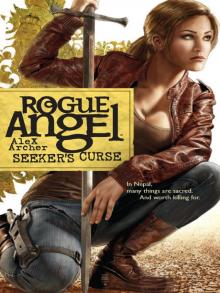 Seeker’s Curse
Seeker’s Curse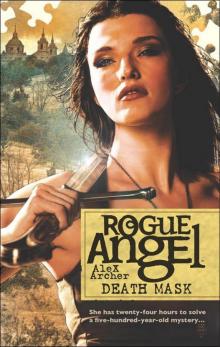 Rogue Angel 52: Death Mask
Rogue Angel 52: Death Mask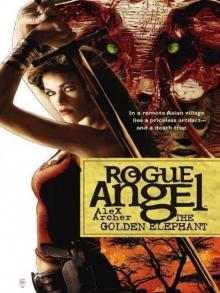 The Golden Elephant
The Golden Elephant Blood Cursed (Rogue Angel)
Blood Cursed (Rogue Angel) Celtic Fire (Rogue Angel)
Celtic Fire (Rogue Angel)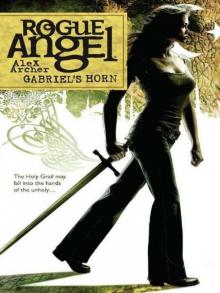 Gabriel's Horn
Gabriel's Horn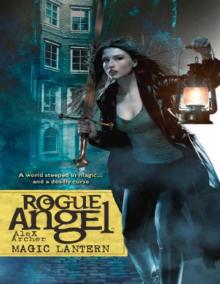 Magic Lantern (Rogue Angel)
Magic Lantern (Rogue Angel) God of Thunder
God of Thunder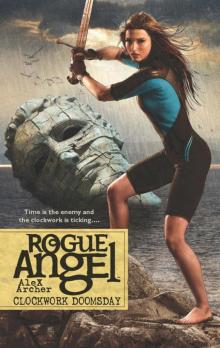 Clockwork Doomsday
Clockwork Doomsday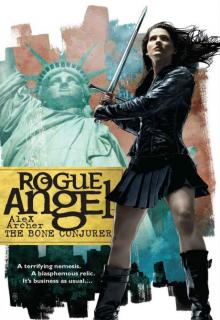 The Bone Conjurer
The Bone Conjurer Treasure of Lima
Treasure of Lima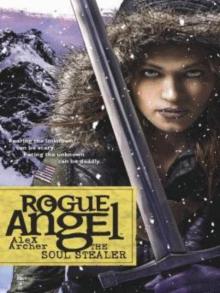 The Soul Stealer
The Soul Stealer The Dragon’s Mark
The Dragon’s Mark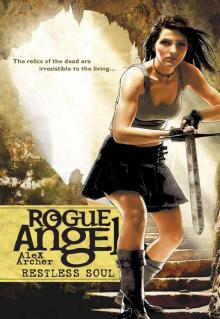 Restless Soul
Restless Soul Rogue Angel: God Of Thunder
Rogue Angel: God Of Thunder Rogue Angel 49: The Devil's Chord
Rogue Angel 49: The Devil's Chord Death Mask
Death Mask Rogue Angel 46: Treasure of Lima
Rogue Angel 46: Treasure of Lima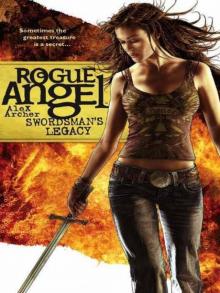 Swordsman's Legacy
Swordsman's Legacy The Oracle's Message
The Oracle's Message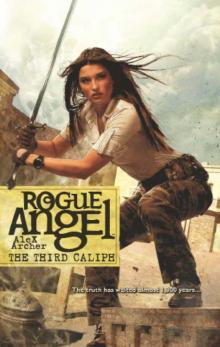 The Third Caliph
The Third Caliph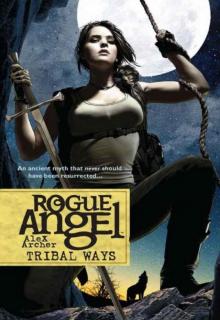 Tribal Ways
Tribal Ways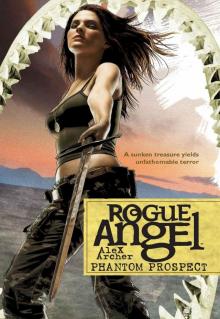 Phantom Prospect
Phantom Prospect Rogue Angel 50: Celtic Fire
Rogue Angel 50: Celtic Fire Library of Gold
Library of Gold Rogue Angel 53: Bathed in Blood
Rogue Angel 53: Bathed in Blood Sacred Ground
Sacred Ground The Devil's Chord
The Devil's Chord Serpent's Kiss
Serpent's Kiss The Vanishing Tribe
The Vanishing Tribe Sunken Pyramid
Sunken Pyramid Sunken Pyramid (Rogue Angel)
Sunken Pyramid (Rogue Angel)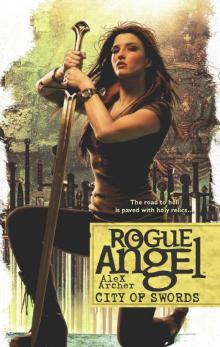 City of Swords
City of Swords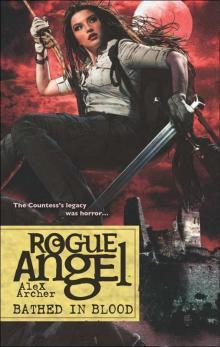 Bathed in Blood
Bathed in Blood The Lost Scrolls
The Lost Scrolls The Babel Codex
The Babel Codex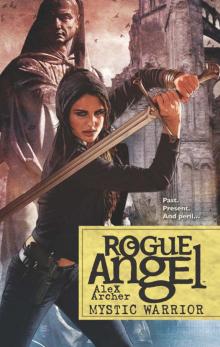 Mystic Warrior
Mystic Warrior Eternal Journey
Eternal Journey Beneath Still Waters
Beneath Still Waters Solomon's Jar
Solomon's Jar Beneath Still Waters (Rogue Angel Book 55)
Beneath Still Waters (Rogue Angel Book 55) Cradle of Solitude
Cradle of Solitude Secret of the Slaves
Secret of the Slaves River of Nightmares
River of Nightmares Polar Quest
Polar Quest False Horizon
False Horizon